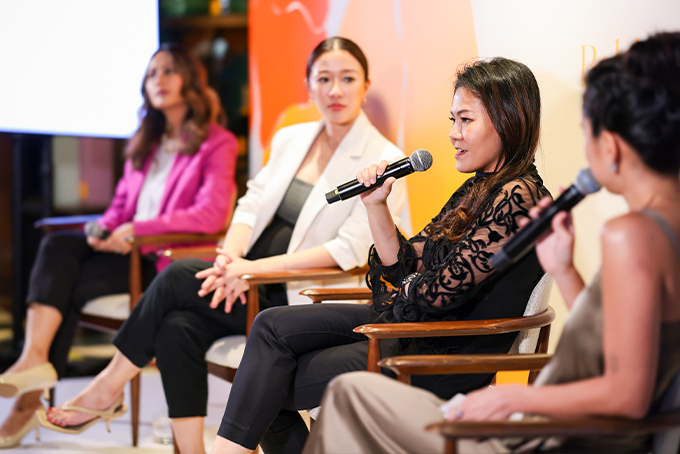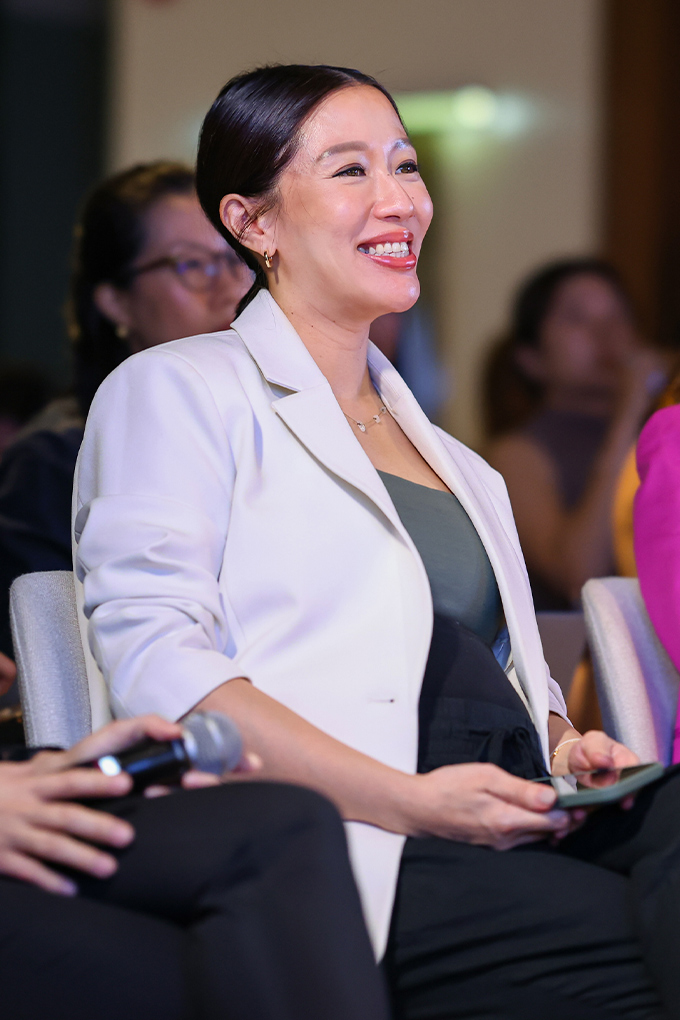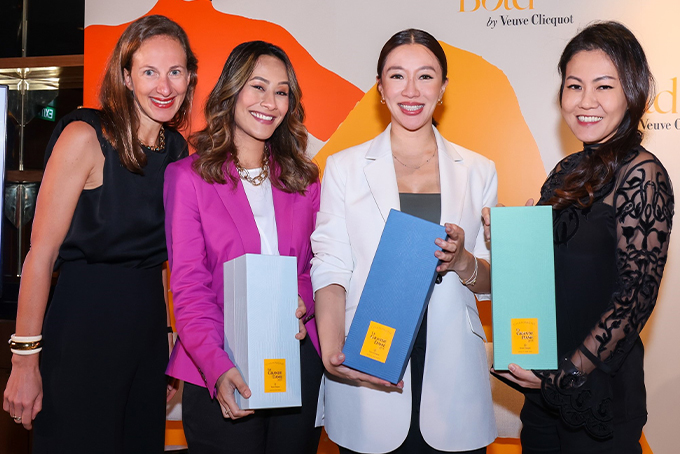The spirit of female entrepreneurship has been ingrained in Veuve Clicquot’s DNA ever since Madame Clicquot took the reins of the maison after the death of her husband in 1805. In a time when most women neither worked nor held a bank account, she brought innovation and creativity to the champagne industry—inventing the first vintage champagne as well as the first rosé.
Earning the title of ‘Grande Dame of champagne’, her extraordinary legacy is the driving force behind the champagne house’s enduring commitment to supporting and celebrating female entrepreneurs.

This commitment first took the shape of Bold by Veuve Clicquot in 1972, a programme designed to increase inclusion, impact and visibility for female entrepreneurs. The Bold Woman Award was created to spotlight women in business, and later in 2014, the Bold Future Award was established to encourage young, emerging entrepreneurs. To increase visibility for women in business worldwide, the maison also launched the Bold Open Database to list all female entrepreneurs worldwide—allowing them to be known to both their peers as well as entrepreneurial, economic, social and financial systems.
In 2019, the champagne house took a big step towards deepening their understanding of global female entrepreneurship by publishing its first international barometer—conducted in 14 countries. Over the years, the barometer’s scale has vastly grown. Now, it exists as one of the few tools able to provide a snapshot of the world’s perception regarding women in business. For the first time, Singapore’s inclusion in the groundbreaking study delivers valuable insights into the local landscape of female entrepreneurship.
Unveiled at the brand’s first-ever Bold Conversations in Singapore—a part of its Bold programme that serves as a platform for deeper conversations about female entrepreneurship—the results reveal that Singapore has one of the lowest gender gaps in entrepreneurship globally. At four percent, the number is lower than 16 of the 25 countries measured. Yet, gendered biases and inequalities still persist in our country, with most believing that breaking into the business world is more challenging for women than men due to limited access to funding and difficulties in balancing work and family responsibilities.
“Madame Clicquot’s extraordinary legacy is the driving force behind the champagne house’s enduring commitment to supporting female entrepreneurs”
To discuss the findings, Veuve Clicquot gathered three trailblazing female entrepreneurs making their mark in Singapore. Moderated by actor and presenter Naomi Yeo, the panel featured Johanne Siy, chef-partner of Lolla, Rachel Lim, co-founder of fashion label Love, Bonito and Sarah Bagharib, founder and director of media company Crazycat.
Across the sectors of fashion, media and food and beverage, the panellists shared their experiences in their respective fields and what they’ve learned along their entrepreneurial journey. Below, see all the highlights from the event.

The true meaning of entrepreneurship
“To me, entrepreneurship is about forging your own path. It’s about doing something that’s not been done before, having a vision of what the possibilities are and building something meaningful,” shares Siy.
“When Love, Bonito first started 18 years ago, no one really talked about entrepreneurs, much less female entrepreneurs,” muses Lim, “Over the years, I’ve seen how the concept of entrepreneurship has evolved, in ways both good and bad. I do think that entrepreneurship is over-glamorised today, such that a lot of young people feel that starting your own business is necessary to succeed in life. But I believe that all of us have different paths to success. Entrepreneurship, to me, is about seeing a need you want to meet or a gap you want to fill, and coming up with ways to do it.”
Bagharib adds, “Entrepreneurship means courage and vulnerability. You need to be prepared to put yourself and your ideas out there for the world to scrutinise. At the same time, it’s also about making a positive impact.”

On the entrepreneurship gender gap in Singapore
Bagharib is not surprised at Singapore’s low entrepreneurial gender gap. “Amongst the community of small business owners, there are plenty of women. But I’ve also been in spaces where entrepreneurship is still perceived to be quite masculine. I went through an incubator programme where I pitched my idea for Crazycat, and was told that I was limiting my market by focusing on women as my target audience. I thought that was quite a myopic perspective.”
Siy adds, “It will be interesting to see how the gender gap might vary depending on the scale of the business. As we scale up our businesses, the things that hold us back—the lack of infrastructure or access to funding—get more apparent.”

Being bold in the face of gender inequality and discrimination
“In order to succeed, confidence matters just as much as competence. Women are no less competent than men, but why is it that we hesitate to raise our hands for a bonus or a promotion, or just to start a conversation that is well within our right? I think that it’s very much related to seeing meeting rooms full of male executives, especially back when female entrepreneurs were not as common,” shares Lim. “What helps, I’ve realised, is to know your business inside out, so you can maintain your confidence and keep a clear head no matter what questions people throw at you.”
Siy echoes the sentiment, pointing out that a big barrier to success for women is often their own perceptions of themselves. “There’s a lot of imposter syndrome at play. We second-guess ourselves, thinking that we don’t deserve to be where we are, but we are capable of so much. As women, we have our own strengths, and we should embrace what comes naturally to us instead of working to become more like men or like anybody else.”
“I think it’s important to introduce a different layer to this discussion, as a woman of an ethnic minority group,” notes Bagharib, “The playing field is not level for women, let alone for minority women. It’s great to have the confidence to say we don’t want to limit ourselves to our identity as women. But unfortunately, the reality is that my identity as a woman of an ethnic minority group has limited my access to opportunities and mainstream connections. The next step forward is for women, as allies, to consider our privileges and how we can use them to help bring all women together.”

Why the gender gap persists
“Women are conditioned to try and achieve perfection before we present our projects or ask for funding. We’ll go through thousands of revisions by ourselves, as opposed to just pitching it and possibly getting helpful feedback to refine our ideas in return. We are sometimes hesitant to take that first step, and that’s probably one of the reasons why you don’t see as many female entrepreneurs,” notes Siy.
“That’s something that I’m struggling to unlearn in my journey as a solo entrepreneur right now,” shares Bagharib. “Being meticulous and a perfectionist can be a strength, but if you recognise that it’s getting in the way of your work, then you need to learn to take a few steps back. Your work doesn’t always need to be perfect. Sometimes, you just need to get one foot in through the door.”
“As women, we tend to think that we need to meet every criterion on the list before we, say, ask for a raise. Men, on the other hand, tend to have the mindset that so long as they check five out of 10 boxes, they can grow into the new role. That really makes all the difference,” adds Lim. “We are taught to hold ourselves back so much, and I think it’s something we need to learn to be mindful of and overcome.”

Overcoming self-doubt
“When we look at examples of successful business owners, it is almost always a male figure. That becomes the person we constantly compare ourselves to, and we immediately become very critical, because we may differ on so many factors. But what changes that perception is when we realise that a male model is not the right person to compare ourselves to at all,” notes Siy.
“Growing up as a young entrepreneur, the only prominent people I could look up to were the likes of Mark Zuckerberg or Steve Jobs. For the longest time, I thought that I’d have to be like them in order to be deemed successful, and it was only halfway through my journey that I realised I hated the person I was becoming when I was trying to emulate them,” shares Lim, “I realised I should just lean into my own natural abilities and strengths. For female entrepreneurs, that tends to be empathy. At the same time, as women, we also tend to be more sensitive. We pick up feelings or glances from the room very quickly. One thing I’ve learned is to not take things so personally. Oftentimes, people aren’t as critical of us as we think they are. And even if something goes wrong, the most important thing is that I’ve learnt from the experience.”
Bagharib adds that self-doubt can be nurtured to become a positive force. “For me, it took years of unpacking my doubts, my strengths and my weaknesses to figure out why my inner voice was so loud. I believe that it is, in part, because of the lack of media representation. Working in the media, diversity is something I’m very conscious of. The versions of successful entrepreneurship that we see are all of men, and I have internalised the lack of representation of women who look like me. So it’s really a systemic issue, not just for women of colour, but for women in general. And it takes a lot of hard and uncomfortable work to deepen that self-awareness on why your self-doubt festers.”

Advice for aspiring entrepreneurs
Siy’s advice is to be aware of your point of difference and point of parity. “That means knowing what sets your business apart, and also the ways in which you can equalise the playing field for yourself. For example, when you look at all the basic skills needed for entrepreneurship, you need to work on your weaknesses to be able to achieve at least parity on those metrics. At the same time, make sure you don’t neglect your natural strengths, because those will make you stand out.”
As for Lim, she shares three pieces of crucial knowledge. “Firstly, know your ‘why’. “Why is it that you want to do what you do? Why is it your business needs to exist in the world today? Keep questioning yourself and digging deeper, and you’ll find your ‘what’ and your ‘how’ naturally. Secondly, entrepreneurship has no age limit. If I could turn back the hands of time, I would really have really liked to work under different people and different brands in the industry to learn from them and see for myself what goes on behind the scenes. Lastly, everything rises and falls on leadership. It’s important to take control of our own learning and to constantly invest in ourselves emotionally, mentally, intellectually and even physically. The better the leader becomes, the better the quality of team members they will be able to attract as well, and that can make all the difference in the trajectory of a business.”
Bagharib’s advice is to trust both your employees and the process. “I thought I was going to go deep into entrepreneurship in 2018. That’s when I first launched Crazycat. I tested the market, ran a big scale event, and realised that this business was something I could actually do. And then I became pregnant and a mum. That’s something that undeniably will change your priorities. At that point, I thought that it was not the right time to start a business, but I still believed in the power of Crazycat as a company that can impact women positively, and I surrounded myself with people who believed the same thing. It didn’t happen overnight, but I think you need to truly believe in your business and your ideas to make the magic happen.”
Register for Veuve Clicquot’s Bold Open Database here.






